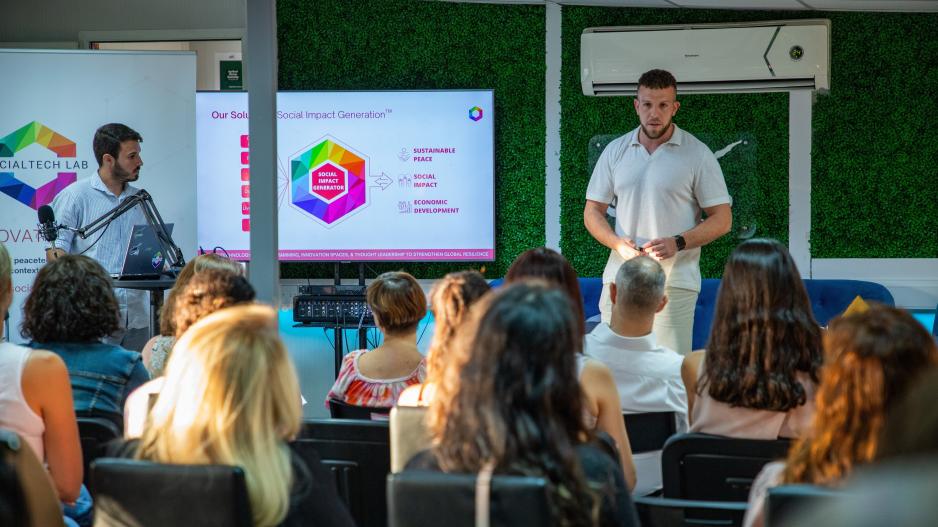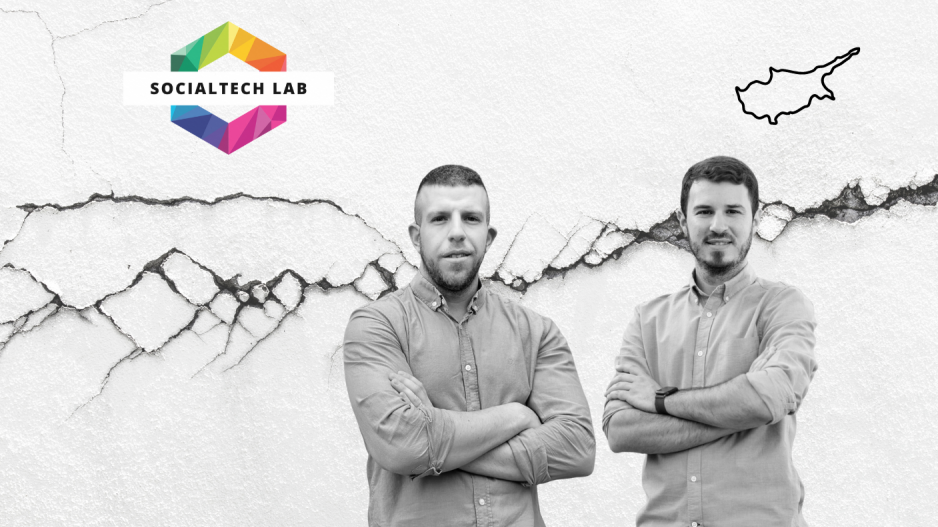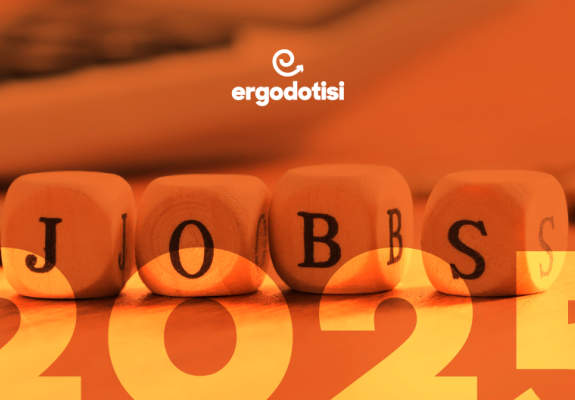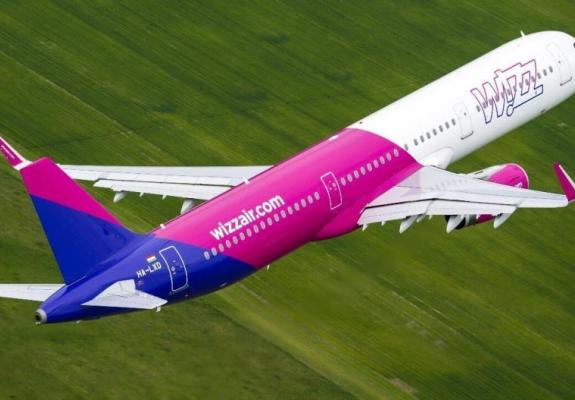SocialTech Lab: Reunification on the Ground, One Person at a Time
Co-founders, Burak Doluay and Steven Stavrou, Speak to FastForward About Leveraging Tech for Peace and Addressing Conflict
Peace, conflict, division, reunification. How can these be related to technology? Yet, the ever-increasing impact of tech and its subsequent tools on our lives has brought innovations and opportunities, even in areas few would have imagined suitable for such application.
SocialTech Lab is a prime example, as it leverages a range of tools from the fields of entrepreneurship, innovation, and technology, aiming to create a different culture of collaboration and authentic communication from the ground up. Cyprus, as a post-conflict area, could not be a more suitable location for such initiative.
The actions of the organization cannot be approached solely from the perspectives of entrepreneurship and technology, as their outcomes contribute to how the two communities perceive their mutual relationship. And as history shows, it is meaningless for political leadership to attempt to resolve long-standing issues without preceding actions of 'low politics', i.e., initiatives of cooperation and understanding between the two sides, which aim to foster a sense of belonging and co-existence.
All these initiatives, of course, are not impersonal or divinely ordained. Behind them are individuals with goals, persistence, and vision. Today, FastForward talks with two such individuals, Burak and Steven, co-founders of the SocialTech Lab, providing insights into what PeaceTech truly entails in practice.
If nothing else, the interview sheds light on a highly dynamic project, addressing a broader issue that, unfortunately, is primarily characterized by dangerous stagnation.
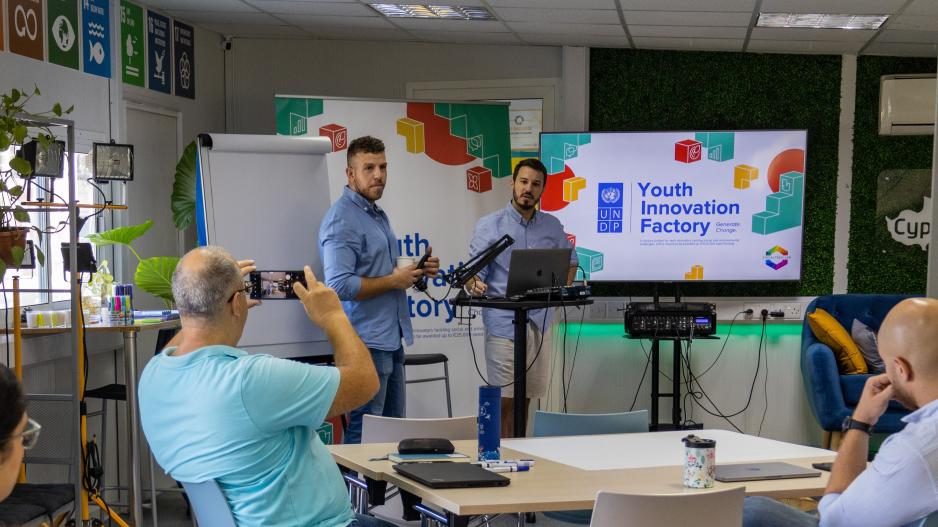
We define PeaceTech as technological products or services that contribute to positive peace within a community, country or even in a region. These are solutions that focus on predicting, preventing or solving issues that pose a negative impact on the economy, environment, human rights, democracy, and/or quality of life.
Conflict is classified in 5 stages. In its first stage, the conflict is latent and it slowly starts to grow (some people might not be aware of it). At its second stage, the conflict is felt and confrontation happens. The third stage is the peak of the conflict where crisis begins, and at the fourth stage the outcome of the conflict is evaluated to decide on next steps. The last stage is the aftermath, where conflict resolution happens.
PeaceTech solutions could be used to address different stages of conflict in different contexts, with more opportunities for innovation during earlier and later stages of conflict and less during crisis periods. Some examples include using digital tools or VR environments to accelerate healing traumas after conflict and facilitating dialogue, to using AI to analyze social media to identify hate speech and predict social distress before it happens. More tangibly speaking - in Cyprus for example - we are about to launch our mobile app connecting entrepreneurs island-wide and to foster dialogue amongst entrepreneurs and we’re developing other tools such as conversational AI to support with bicommunal business partnerships.
We utilize a unique model that combines digital tools, live entrepreneurship/innovation programmes, and physical spaces that address the needs of different communities. Since 2016, we’ve turned our knowledge and experience into a model we call a Social Impact Generator™, which can be applied anywhere in the world. We firstly conduct research to understand the needs of different communities and specifically of local entrepreneurs. With those outcomes, we design custom capacity building initiatives, digital tools, physical spaces, custom programmes and furthermore participate in policy think-tanks to recommend changes.
To foster collaboration among entrepreneurs in Cyprus, SocialTech Lab operates CyprusInno and The Base by CyprusInno. CyprusInno is an island-wide entrepreneurship platform of digital tools and live startup/entrepreneurship programs in Cyprus. The Base by CyprusInno, the world's first Social Impact Generator™, combines the elements of a coworking space, accelerator/incubator, innovation center, and multimedia studio in Cyprus’ Buffer Zone.
Our 7+ year track record has garnered a 5000+ community, 50+ programs (accelerators, venture builders, hackathons, etc.), and 10+ digital startup tools (i.e., e-learning).
We've run many programmes and accelerated many teams over the past 8 years, some of which have received funding to scale
By applying this model in Cyprus, we have recorded that 40% of our participants visited the Buffer Zone or met someone from the other community for the first time, and 60% were attending an inter-communal programme for the first time. We've run many programmes and accelerated many teams over the past 8 years, some of which have received funding to scale. You can review our 2023 Impact report highlighting more of these stories here.
It’s simply creating a neutral, non-political, collaborative ecosystem for entrepreneurs or other innovators where there are easily and equally accessible support mechanisms for them, as well as safe spaces for them to work together. Oftentimes, dialogue and long-lasting partnerships happen naturally as an outcome of the process. The formation of new teams, new ideas, and new ventures, along with an increase in funding to teams, the creation of new job opportunities, and consistent dialogue amongst participants is what contributes directly to positive peace.
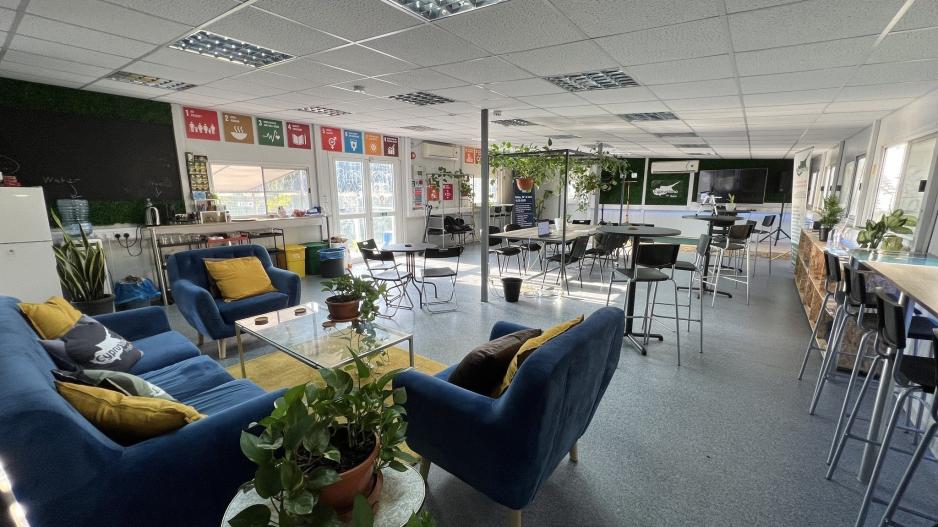
Indeed! The location greatly contributes to our values of providing a neutral space for participants. It serves as a safe space for those participating in inter-communal activities for the first time. Logistically, it’s easy to access for everyone, especially for longer programmes like academies, venture builders or accelerators. It’s a midpoint that everyone can easily access on foot without the hassle of driving through checkpoints. Additionally, it allows us to include 3rd country nationals from all around the island in our programmes, which expands our scope from creating dialogue amongst just Cypriots to doing so with any entrepreneur residing on the island.
The Buffer Zone can be a reminder of a difficult past - and, quite frankly, a stranded present. However, we’ve built The Base by CyprusInno to symbolize a hopeful future
The Buffer Zone can be a reminder of a difficult past - and, quite frankly, a stranded present. However, we’ve built The Base by CyprusInno to symbolize a hopeful future. It’s a contrast between old and new that one of our partners once labeled as “tragically cool.” The idea being that once you’re inside, the vibe of the space alters your mindset. It helps people be productive, collaborative, and open minded.
We, like many others, are grateful to UNFICYP for helping facilitate spaces in the Buffer Zone for people to come together like this.
The support of national authorities can be challenging at times due to the nature of the work we do, and that’s understandable since we work on bringing together “conflicted sides” - and using new methodologies to do so. However, we’ve seen some encouraging steps over the last few years. For example, we received support from public authorities in some of our programmes, such as the Cyprus Ministry of Agriculture and the Research and Innovation Foundation who participated in our agrifood startup initiative to present national and EU level opportunities for participants. Additionally, we were selected and nominated by the Cyprus Ministry of Energy, Commerce and Industry to the European Enterprise Promotion Awards (EEPA) 2023 awards as a national winner in the category of "Responsible And Inclusive Entrepreneurship".
On a supranational level, we’ve seen great outcomes working with different UN groups and agencies, as well as with various EU-funded groups and international representations of other countries in Cyprus. We’ve run programmes with UNFICYP and support each others’ events. We’ve also worked closely with UNDP Cyprus to implement their venture builder - the UNDP Youth Innovation Factory - which has the potential to expand regionally through their network. These types of partnerships really help in enabling networking, funding, reach, amongst other benefits.
PeaceTech is becoming a more commonly used term globally, and many organizations are committing to investing more in innovative tools to facilitate peace - from the UN to socially-oriented Venture Capital firms.
We’ve witnessed that people who attend our programmes are not the “usual crowd” you might find at peace-building events, especially in Nicosia. In our latest cohort, we had people participating from Paphos to Karpasia. Through our programmes, we contribute to creating dialogue and partnerships through business collaboration amongst different communities, and through our efforts of creating new technologies in-house we try to accelerate those interactions.
Our work is grassroots and focuses on building bridges at the community level. This is reunification on the ground, through day-to-day interactions, one person at a time
Our work is grassroots and focuses on building bridges at the community level. This is reunification on the ground, through day-to-day interactions, one person at a time. This ultimately can help create better conditions for a political solution - if the will is there.
The success of the teams that participate in our cohorts/programmes and the positive impact we create in individuals’ lives are the main reasons we keep doing what we do.
We love the spark we see in peoples’ eyes when they meet someone from another community and they realize they have unlocked another huge market and range of opportunities with it
We love the spark we see in peoples’ eyes when they meet someone from another community and they realize they have unlocked another huge market and range of opportunities with it. We love upskilling teams to empower them to turn their ideas into impactful ventures, and then following up by unlocking financial opportunities and mentorship for them to grow. This year, we will re-opening some of our previous programmes, as well as launching some new and exciting ones which we will announce in detail this Spring. We’re also looking forward to hosting some teams and organizations from Israel and Palestine starting this March, and connecting them with our own cohorts. You can get all the updates of our new programmes through our social media channels.
Our focus this year is to start implementing our programmes in/for other conflict-affected regions, launching our own tools, while retaining and even expanding our local activities and team - we currently have an open position if anyone is interested!
